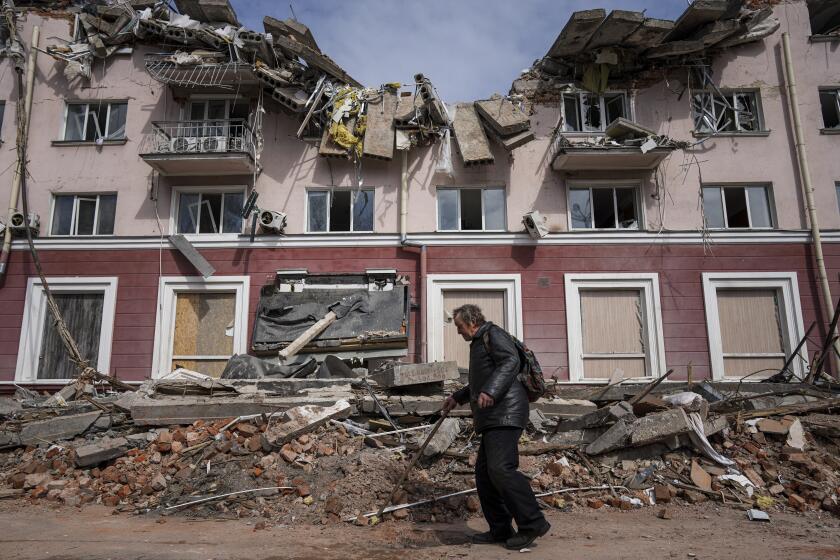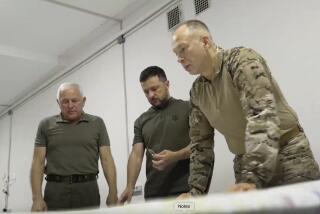As Russia menaces Ukraine’s east, Putin says peace talks hit ‘dead end’
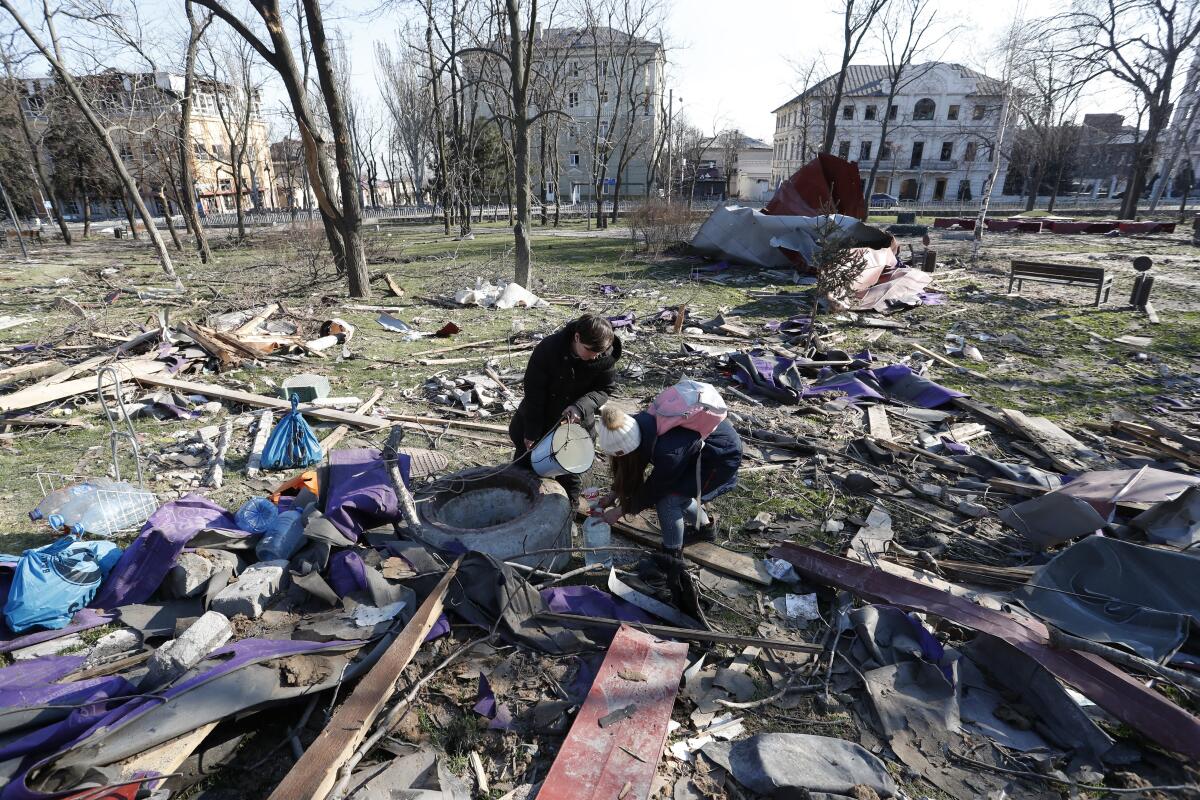
- Share via
KYIV, Ukraine — As Russian forces pressed ahead Tuesday in their drive to seize the strategic southern port of Mariupol and encircle Ukrainian defenders in the country’s east, Russian President Vladimir Putin defended his invasion as a noble cause.
Putin said there was “no doubt” Moscow would achieve its aims to protect Russian security and, blaming Ukraine, said talks between the two sides had reached a “dead end.”
Ukrainian President Volodymyr Zelensky, in turn, rejected the idea that Russia’s nearly 7-week-old invasion, plagued by logistical and supply problems, was going according to plan after Russian troops’ withdrawal from the capital, Kyiv.
“The Russian army has reached a level of irreparable losses higher than that of the Soviet Union in 10 years of war in Afghanistan,” he said in an evening broadcast to the Ukrainian people. “Higher than that of Russia in the two wars in Chechnya.”
Mykhailo Podolyak, a Ukrainian negotiator and presidential advisor, said in a statement that negotiations were difficult “but they are ongoing.”
After failing to capture the capital, Russia was attempting to regroup and redeploy its forces in preparation for an all-out assault in Ukraine’s eastern industrial heartland, the Ukrainian military said in its latest operational report. It also said Ukraine had thwarted half a dozen Russian attacks in the previous 24 hours in the eastern regions of Donetsk and Luhansk.
The Ukrainian city of Chernihiv was under Russian siege and bombardment for 38 days
In devastated outlying areas of Kyiv that endured a monthlong Russian occupation, investigators and Ukrainian troops moved ahead with the bleak and dangerous task of recovering the bodies of civilians and clearing away ordnance left behind in houses and garden sheds, in buildings and on streets, some even rigged on corpses.
Zelensky excoriated Russian troops for trying to inflict new carnage even after their departure.
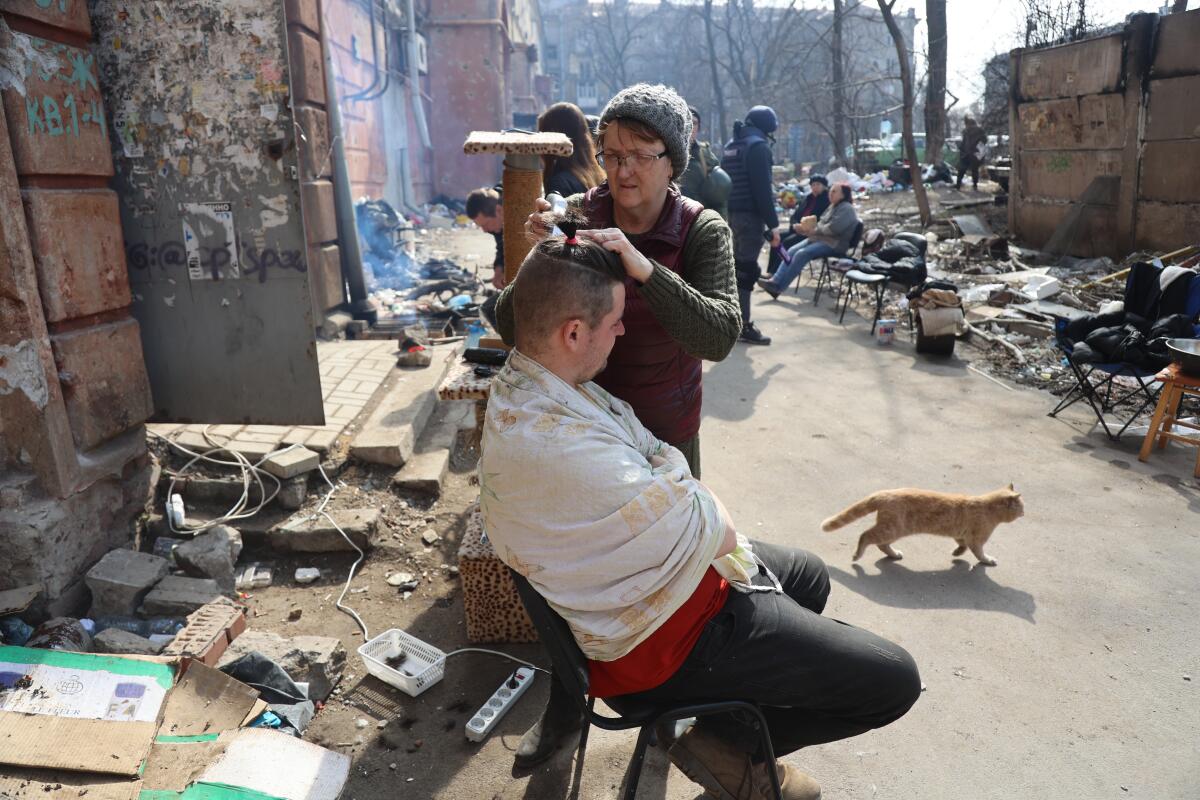
Once-placid suburbs and satellite towns near the capital were now filled with “shells that did not explode, mines, tripwire mines,” the Ukrainian leader said Monday night, adding that the Russian forces “consciously did everything to make the return to these areas after de-occupation as dangerous as possible.”
According to the Office of the United Nations High Commissioner for Human Rights, more than 1,890 civilians, including 153 children, have been killed.
Russia has denied committing atrocities against civilians, but the cleanup crews continued to gather additional evidence of horrific abuses. A senior U.N. official, Sima Bahous, told the Security Council on Monday that “brutality” against civilians must also be independently investigated, including emerging evidence of execution-style killings and rapes.
On Tuesday, President Biden said Russian actions amounted to “genocide,” a term the administration has previously avoided using to describe atrocities uncovered in Ukraine.
“Your family budget, your ability to fill up your tank, none of it should hinge on whether a dictator declares war and commits genocide half a world away,” he said during a speech in Menlo, Iowa, on rising gas prices.
Later, Biden told reporters he used the term genocide because “it’s become clearer and clearer that Putin is just trying to wipe out even the idea of being ... Ukrainian.”
“The evidence is mounting,” he said. “We’ll let the lawyers decide internationally whether or not it qualifies, but it sure seems that way to me.”
Until now, the Biden administration has accused Putin and Russian troops of war crimes, but held back from declaring their actions to be genocide.
“We have not yet seen a level of systematic deprivation of life of the Ukrainian people to rise to the level of genocide,” national security advisor Jake Sullivan said last week.
Zelensky was quick to praise Biden as a “true leader” for his shift in rhetoric.
“Calling things by their names is essential to stand up to evil,” he said in a post on Twitter late Tuesday.
With Russian forces moving into place for a wide-ranging offensive in the east, Ukrainian officials redoubled pleas on Tuesday for civilians to flee while they are still able. On the Telegram messaging app, Luhansk’s regional governor, Serhiy Haidai, said bodies of civilians filled the morgues in several cities and burials were not possible because of shelling near cemeteries. In another post, he implored people to use five agreed-on humanitarian corridors to leave the area rather than “burn in your sleep” from Russian shelling.
In Mariupol, on the Sea of Azov, defenders were continuing to “heroically hold” their positions, the Ukrainian army’s general staff wrote Tuesday on Telegram, a day after a besieged marine unit in the city posted on Facebook that it was running low on ammunition and that the situation was dire.
“Our soldiers remain trapped in the city and have problems with supplies,” Podolyak posted Tuesday on Twitter. “The president and the leadership of the armed forces are doing everything possible (and impossible) to find a solution and help our soldiers.”
John Kirby, a Pentagon spokesman, said it was not inevitable that the southern port would fall to the Russians.
“Our assessment today is that Mariupol is still contested and that the Ukrainians are still fighting to defend Mariupol from the Russian seizure of it,” Kirby said at a Pentagon briefing Tuesday.
Capturing Mariupol would be a significant prize for Russia, because it would allow creation of a land corridor between Russian-controlled territory and the Crimean peninsula, seized by Moscow eight years ago.
Kirby said Mariupol would provide the Russians “unfettered and unhindered land access between the Donbas and Crimea.” But he also stressed that the city was important for Ukraine, because of what it represents to the country’s economic life.
“They haven’t given up on it,” he said. “And we’re not giving up on them either.”
Western and Ukrainian military officials said Tuesday that they were trying to ascertain whether Russia had used or intended to use chemical weapons in a bid to subdue Mariupol. Zelensky said he was paying “great attention” to reports of a projectile with a poisonous substance, but the Russian bombardment made it “impossible to conduct a full investigation and full analysis.”
In a seeming scale-back on the threat of using chemical weapons, a spokesman for Russia-backed separatists in Ukraine’s east — who had said Monday on Russian state television that such munitions would be used against Ukrainian forces in Mariupol — said Tuesday that it had not engaged in such tactics. The spokesman, Eduard Basurin, was quoted by the Interfax news agency as saying separatists “haven’t used any chemical weapons in Mariupol.”
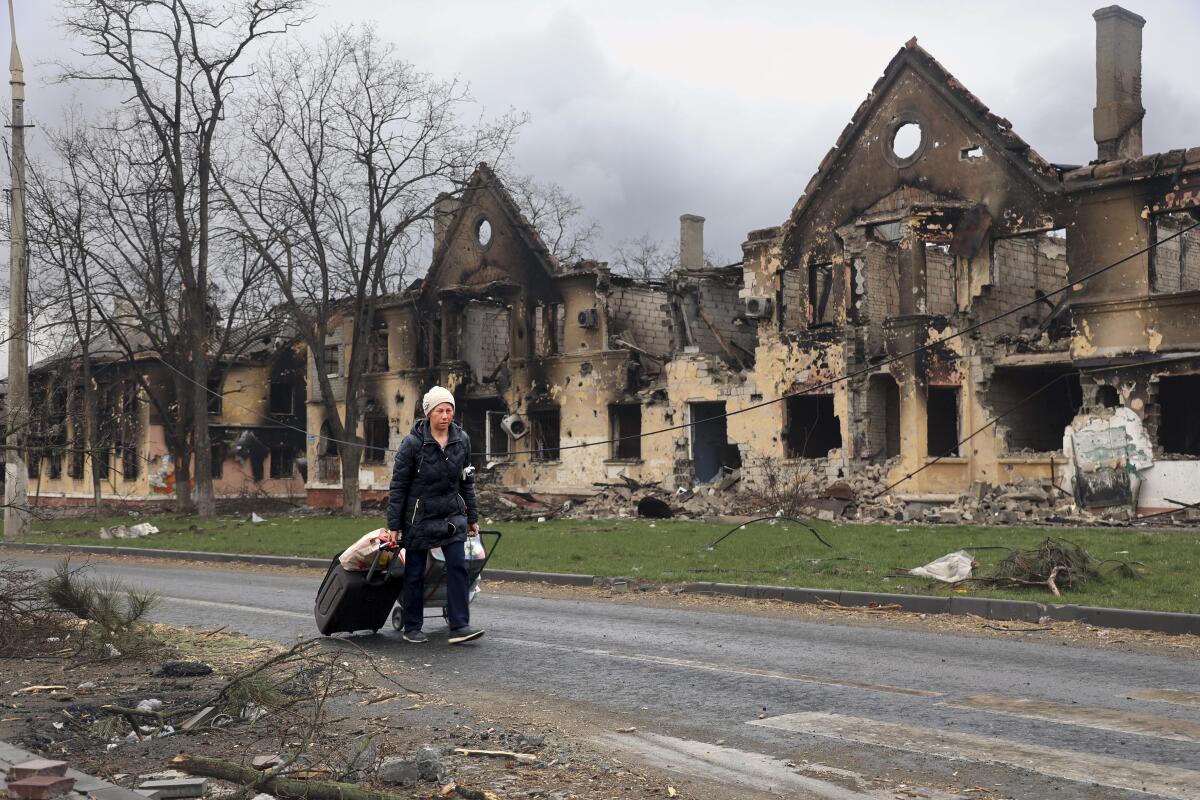
On Monday night, Zelensky said without mentioning Basurin by name that the earlier statement “testifies to [Russia’s] preparation for a new stage of terror against Ukraine and our defenders.” One senior British defense official said Tuesday that if chemical weapons were in fact used by Russian forces, “all possible options are on the table” for a response.
Analysts at the Washington-based Institute for the Study of War noted in a report Tuesday that Russia continued limited offensive operations in eastern Ukraine and had not switched to a broader offensive as it waited for reinforcements to arrive. As a result, it had “made limited gains while continuing to sustain significant losses.”
Fighting in the east had not yet begun in earnest, British military intelligence said in an assessment Tuesday, but combat would “intensify over the next two or three weeks as Russia continues to refocus its efforts there.”
In the meantime, it said attacks were being aimed at Ukrainian positions near the Donetsk and Luhansk regions. It also reported fighting around the southern cities of Kherson and Mykolaiv.
Neighboring Belarus, Russia’s ally, has become a key transit point for redeployment of Russian forces away from northern areas in preparation for fighting in the east. Putin’s comments about the war came as Belarusian President Alexander Lukashenko accompanied him to a spaceport in Russia’s far east.
There, Putin likened the struggle against punishing Western economic sanctions imposed after the invasion to the Cold War-era Russian space program, whose early successes stunned the United States. In televised remarks carried by Interfax, the Russian leader declared that “there is no doubt that we will achieve our goals” in Ukraine.
Sounding themes he has previously used to justify the war, Putin blamed Western aggression, and said he had acted to ensure Russia’s security.
“Its goals are absolutely clear and noble,” he said of Moscow’s military campaign, which has devastated Ukrainian towns and cities and left thousands of civilians dead or wounded.
In an ominous indicator of Putin’s determination to crush dissent at home, the Russian opposition activist Vladimir Kara-Murza was reported to have been detained by police in Moscow. Kara-Murza recovered from two separate life-threatening bouts of poisoning that he and his supporters have blamed on the Kremlin. Word of his detention came from another opposition figure, Ilya Yashin, writing on Twitter.
Ukraine also announced that it had detained a pro-Kremlin Ukrainian politician. Zelensky said on Telegram Tuesday that Viktor Medvedchuk, a Ukrainian lawyer, business oligarch and politician with ties to Russia, had been detained in a “special operation.” Zelensky’s post showed a photo of Medvedchuk sitting in a chair wearing handcuffs and military fatigues.
In his late Tuesday broadcast, Zelensky proposed swapping Medvedchuk for captured Ukrainian prisoners of war and warned that Ukrainian forces would capture more soldiers.
“We will establish the full truth about all these savages,” Zelensky said. “No matter how much time and effort it takes, we will find them all. Let Medvedchuk be an example for you.”
Meanwhile, major Western companies continued an exodus from Russia. On Tuesday, Finland-based telecom network Nokia said it was exiting the Russian market. A day earlier, the Swedish telecom giant Ericsson said it was suspending operations in Russia, and France’s third-largest bank, Societe Generale, said it was selling its controlling stake in Russia’s Rosbank.
Well before it invaded, Russia was clamping down on domestic freedoms and paving the way to mount a war in Ukraine with little home-grown opposition, U.S. officials said Tuesday.
The comments came during Tuesday’s release of the annual State Department human rights report, which examines all 193 countries that are members of the U.N. for abusive practices including extrajudicial killings; repression of journalists, minorities, and members of the political opposition; and treatment of prisoners.
Each report looks at the previous year, so Russia had not yet invaded Ukraine when this edition was completed. Yet discussion of the brutality of Russian actions in Ukraine now dominated release of the report, overseen by Secretary of State Antony J. Blinken.
“Notably we seem to be seeing a crackdown by a regime that is more aggressive beyond its borders and more repressive within its borders,” said State Department spokesman Ned Price. Last year, hundreds of peaceful protesters were arrested, a trend that has only snowballed this year, Price said.
Blinken cited as one positive development the successful U.S.-led move this month to kick Russia off the U.N.’s Human Rights Council.
“A country that’s perpetrating gross and systemic violations of human rights shouldn’t sit on a body whose job it is to protect those rights,” Blinken said.
McDonnell reported from Kyiv, King from Warsaw and Jarvie from Atlanta. Tracy Wilkinson and Courtney Subramanian in Washington contributed to this report.
More to Read
Sign up for Essential California
The most important California stories and recommendations in your inbox every morning.
You may occasionally receive promotional content from the Los Angeles Times.
